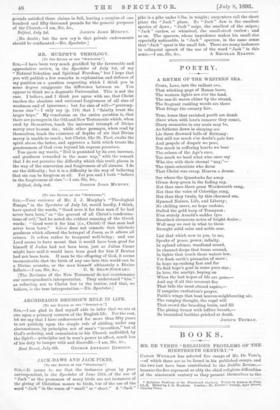[To THE EDITOR, OF THE " SFECTATOR.1 SIR, — Your reviewer of
Mr. J. J. Murphy's "Theological Essays," in the Spectator of July 1st, would hardly, I think, have quoted the words, "Good were it for that man if he had never been born," as "the gravest of all Christ's condemna- tions of evil," had he noted the evident meaning of the Greek words : "Good were it for him (i.e., Christ) if that man had never been born." KoiXov does not connote that intrinsic goodness which allowed the betrayal of Jesus, as it allows all crimes. It refers rather to temporal well-being ; and our Lord seems to have meant that it would have been good for himself if Judas had not been born, just as Julius Caesar might have said it would have been good for him if Brutus had not been born. If man be the offspring of God, it seems inconceivable that the birth of any one into this world can be a Divine mistake, or the man himself ultimately a Divine [The Revisers of the New Testament do not countenance our correspondent's interpretation. They understand " him " as referring not to Christ but to the traitor, and that, we believe, is the true interpretation.—ED. Spectator.]


































 Previous page
Previous page